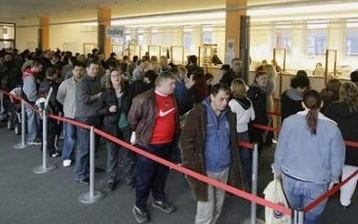Germany discovers new export -- its jobless
(Agencies)
Updated: 2008-04-16 09:34
Updated: 2008-04-16 09:34
BERLIN -- Germany, the world's leading export nation, has long been successful in shipping its state-of-the-art cars and machinery to just about every country.
Now, after importing workers for decades, it has a new entry on its export lists -- jobless Germans.
Plagued by high unemployment due to the turmoil of re-unification and rigid labor laws, Germany has been helping its skilled and less-skilled jobless workers match up with foreign employers searching for manpower.
|
|
The country has also been offering financial support to cover moving and transportation costs for the hordes of unemployed Germans in search of jobs across the European Union, and even as far away as Australia and Canada.
As an example of how it works: a newspaper on the Canary island of Fuerteventura was recently filled with adverts placed by Germans hunting for jobs.
"German seeks job in hotels or tourism," read one. "All relocation and travel costs paid for by German Labour Office."
Germany had an unemployment rate of 8 percent in February, about one percentage point higher than the Eurozone average: 3.6 million people are without jobs and more than 155,000 Germans emigrate each year.
Many thousands have been helped by the Labour Office's International Placement Service (ZAV) in Bonn, which offers to some "Mobilitaetshilfe" (mobility assistance) or a "Mobilitaetspraemie" (mobility bonus).
The funding, known as the "Mobi," helps cover moving and travel costs for jobless Germans and their families. It is discretionary and aimed at those with job prospects abroad, although it is also available for relocations inside Germany.
"The mobility assistance benefits can be used for moves to anywhere in the world," said Sabine Seidler, spokeswoman for the International Placement Service (ZAV) in Bonn.
"They're granted on a case-by-case basis and there's no upper limit on the sum involved. Applicants usually must have a contract and meet certain criteria. The main purpose is to help those who've lost their jobs find work as quickly as possible."
Neither the Federal Labour Office nor the ZAV could quantify the total cost or impact of the scheme because grants are administered by nearly 200 regional offices.
Officials at the European Commission in Brussels and in Bonn said they were unaware any of other EU country offering such help for moves abroad. In Austria, unemployed people can receive a one-off payment of up to 4,632 euros ($7,336) for relocation costs for a job within Austria.
|
||
|
||
|
|
|
|


